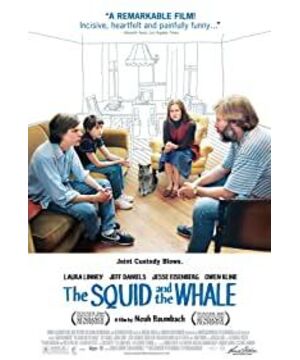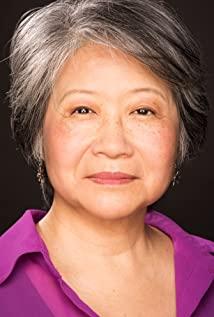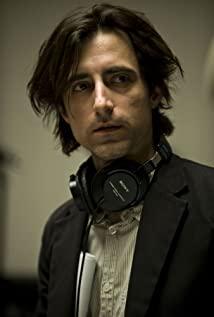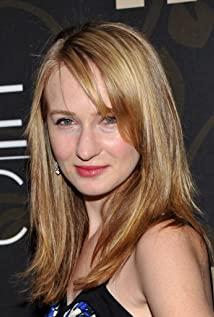"Squid and Whale" criticizing angels and dolphins . Of course, according to the theme and ending of the film, the whale and the pink squid are shockingly fighting. Another translation "Squid and Whale" is more accurate.
Squid: One of the three ocean kings. The king squid is shaped like a squid and often conflicts with whales. According to reports, a whaler in Newfoundland once witnessed a life-and-death battle between the king squid and the whale, and finally the squid king Use the tentacles against the nostrils of the whale to suffocate and die.
Whales: They often appear in matrilineal groups, and middle-aged females are the most precious. Among them, sperm whales are the most famous. Their main food is squid, and their favorite is king squid.
When a whale meets a squid, it breaks the fairy tale of angels and dolphins, subverts all gentle hopes and conventional patience, and tears the veil of intentional or unintentional in life. This is an encounter determined by fate, a duel pursued from instinct, a run of equal and sympathy, and a line of tears of death bursting out of the sky and the earth.
The confrontation between the squid and the whale vividly hints at the relationship between the protagonist and his wife, implying the ubiquitous collision and fragmented loneliness of modern families. People often cannot keep their distance from this world, but they can cruelly destroy the trust of their loved ones.
Criticism One: The arbitrariness of the family’s right to speak
Bernard’s family was a middle-class family of new intellectuals in Brooklyn, USA in 1986. They are excellent in economic income, social status, personal cultivation and cultural accomplishment, and behave differently. . According to Marx, the advanced culture and the concept of advanced life in society are in the hands of intellectuals; according to Zhou Enlai’s analysis of intellectual needs and they are all "conceited"; according to Schiller, intellectuals are people who live by thinking; according to the times The weekly says that an intellectual is not only a person who reads a lot, but must have an independent spirit and original ability.
The writer Bernard and his wife, Joan, fit all of the above. There is often a price to be paid to reach a certain height, and the most typical example of intellectuals is that "the height is too cold." Bernard judges whether a person is worthy of association only by a simple but very harsh criterion: whether the other person is a layman who does not understand literature and does not read classics. So he was almost in a state of solitary self-admiration and absolute self-esteem, including his wife who became a writer with his own hands. He asked her to change the novel to what he thought was a wonderful ending. After being resisted, he was immediately furious. So sometimes the stubbornness of intellectuals is more terrifying than the stubbornness of fools, because the latter is only harming oneself, while the former may cause harm to the country and the people. Of course, Bernard is far less harmful than this, he is just the biggest culprit who bears the unshirkable responsibility for the fragmentation of the family.
The film is fairly evenly distributed in the scores of each role, but the viewing angle is different. The description of the male protagonist Bernard is very delicate, every line is wonderful, and it can be found that the director’s ideal spokesperson is this guy. Nader, although it looks no different from other walls to the naked eye, it is the load-bearing wall in the whole family scene. However, Bernard is definitely not a figurine of patriarchy or patriarchy. This can be demonstrated from the topics between him and his son, including discussing female vagina monologues with his son in high school, and the sex life with the child’s mother. Intimate and bold topics are mostly based on a relaxed and equal atmosphere like friends, which is enough to become an "excellent negative teaching material" for China's education mechanism.
Bernard’s sovereign advantage is mainly manifested in that he enjoys and values his superiority as an elder and a wise man. In his attitude towards his son and wife, he is more like a meticulous and perfect mentor, often with sincere enthusiasm. Instill all your own insights and thoughts into the minds of others, regardless of whether this obsessive thinking is really suitable for the other party, or is a wise move. Obviously, the eldest son, Walter, is more "subordinate to his father" and regards his father as an object of worship. He tries to imitate his tone, manners, and opinions, and can draw inferences from one another. Correspondingly, Bernard, who can read "A Tale of Two Cities" and "Great Expectations" sharply, has regarded his son as Bernard II, his pride and successor, but when he brought his son an adult worldview , He ignored the importance of a child's conscious experience in growing up. When his son’s girlfriend ate with him, he told himself about the bold behavior of another literary young woman, and did not care about the embarrassment of the person in front of him. This is tantamount to denying his son’s vision of making friends with women from the side, causing his son to be indecisive and indecisive. Chaoqin Muchu's behavior.
Secondly, for the youngest son of the "mother party" Frank, he has also continued to popularize the "menner" education method for him. He denounced and attacked Frank. The tennis coach who expressed appreciation was a simple-minded and not worthy of respect. "Iron can't make steel" seemed barbaric to Frank, and he even tried to suppress him in his father's name three times twice, but the result was always counterproductive.
Obviously, Bernard is advocating a purely spiritual high-oxygen life. This family has indeed obtained happiness in the spiritual world that ordinary people do not enjoy, but at the same time, it is also restricted by its own height and enters a kind of paranoia. Way, unable to make friends and understand the peace of ordinary people. It is no wonder that from the perspective of his son's girlfriend, "family like you did not enjoy the warmth of life."
Criticism 2: The incompetence of married life
Helen Fisher, an anthropologist who specializes in "love", has reduced the various manifestations of love to biological and chemical effects. She believes that a medium called dopamine in the human brain is an important link in the creation of love. Dopaminergic It is a bit similar to obsessive-compulsive disorder. It's a pity that passion usually disappears. This kind of dopamine secretion will fail to keep up with the situation as the brain becomes more and more adaptable, and love will wither after all. Obviously, Bernard and Joan definitely went through a maddening love affair. Whether it was Bernard's drive to Joan or those like-minded sharp words, it shows how perfect the foundation of this marriage itself is. And sturdy. However, the actual result is the failure of married life, and the fatigue of 17 years of marriage, like a chronic infectious disease, consumes all the energy of two people.
There is a kind of couple who will consciously transform into peaceful and tolerant affection after passing the passion stage. They are usually a couple that are not too different in viewpoints and can complement each other; but the apparently similar personalities like Bernard and Joan, in the early days Couples who resonate a lot are more likely to argue with each other.
Joan’s relationship was derailed for three years, and both sides believed that they had given each other a chance to save. However, the three quarrels in the film explained the danger of this effort. It is particularly noteworthy that there are only three scenes between the couples in the film. The narrative of the film is mainly about three quarrels as a turning point. The first time Bernard asked Joan to change the end of his novel. Joan insisted on his own opinion, and Bernard dropped Joan’s phone on the spot. This quarrel opened the prelude to the story; the second time After the divorce, Bernard paid a visit. Obviously, he meant to ease the deadlock. However, after he said a few haha greetings, he turned to accuse each other, and finally broke up again; the third time was the end. , Bernard and Joan quarreled thoroughly and tried vicious words for the custody of the child, and finally ended in Bernard entering the hospital.
The chronic killer of the relationship between husband and wife is definitely quarrel, but the nature of quarrel can be divided into two types: the first phenomenon is that couples often quarrel on trivial matters such as disagreement, food disagreement and appetite for furniture. Once a quarrel, it will cause trouble. Divorce, neighbours are often in a state of being harassed. However, this type of couple is the common saying of "fighting at the bedside and at the end of the bed". Although life is not beautiful, most of them will be noisy and noisy for a lifetime; the second type It is a seemingly sane and sober family, rarely disregarding the dignity of both parties to break the polite appearance of marriage, but accumulates dissatisfaction with each other in their hearts, until the volcanic eruption did not smash the sieve, this punch often stunned each other , The rupture is almost difficult to remedy.
Bernard and Joan obviously belong to the second category. They don't understand each other's psychological activities. Instead, they go their own way and use their own rules to judge the behavior of others. Even their actions in saving the marriage seem too vague. Joan thinks that his derailment is actually thinking about whether the marriage can continue. It is the last struggle. Bernard thinks that he has a clear conscience in the process. Of course, his actions are limited to immobility and sickness. Joan made a dinner. As a result, the efforts of the two populations still lack the most basic communication and sincerity, and they have not even learned the third-rate communication method of Xiaodou Yiqing.
The relationship between husband and wife is at this point. However, what is even more sad is that the client still does not know how to reflect after the event, but regrets that he has paid too much for the marriage, which has gone too far on the wrong road. As mentioned earlier, the failure of the marriage life does not mean that the marriage itself is wrong. Bernard has repeatedly revealed that after meeting Joan, he missed the opportunity to hang out with other women. This idea contains the wavering of his young choices. It is true. Irresponsible selfishness.
The film does not reveal the process of their emotional breakdown, but leaves enough space for the audience to explore through some plots. The two men Joan chose when he decided to find his own life were completely opposite to the "mennery" advocated by Bernard. An ordinary neighbor of nine to five and a young tennis coach were obviously right. Newborn, unfamiliar, ordinary, and safer yearning for emotional home.
Bernard lying in the ambulance at the end of the film said to Joan: "Bitch," Joan is furious, but this is their tacit understanding of a literary work when they were young, and the little secret of the two people's humor. I forget that they have not had such conversations and shared feelings for a long time. This is a true feeling under certain conditions, such as a faint fire. As for whether it can spread the light, the film is very refined and does not continue to explain, including not a scene of Joan visiting the hospital. Don't have to guess their future, just like don't guess whether Ruth and Jack will be together. Because the real life is complicated, there is no end to it, only a piece of understanding.
Criticism 3: Family conflicts emerge endlessly.
The world is afraid of alliances. An alliance inevitably means that there is an opposing party, and once the problem arises in the family, it will be torn apart.
The eldest son Walter is the father's party, and the younger son Frank is the mother's party. This situation is reflected in most families with many children, regardless of whether it is related to genetics and other scientific theories, but it is definitely related to parental education and personal preferences. Obviously, Bernard and Joan are typical examples of uneven exertion. Although their education methods are very open and focus on cultivating individual thinking, because their family lifestyles are different, when four thoughtful people get along, all the contradictions are instead. Appears more prominent and remote.
The first is the conflict between the eldest son Walter and Joan. The former believes that all the problems of divorce lie in Joan, who has derailed his feelings. He avenged her husband, concealed it from her son, and faced the eldest son’s accusations. Joan always wanted to communicate in a soft and reasonable way, but always refused to listen. Insulting language. The film’s account of Joan’s life is obviously different from Bernard’s positive portrayal. Instead, it’s a non-repetitive profiling approach. It outlines a frailty by comparing the memories of the elder son who is at odds with her and the status quo. And the meticulous mother. For adolescent children, same-sex communication is obviously more natural and intimate. The estrangement between Joan and the eldest son is an inevitable law of physiology. After his emotional inclination towards his father, Joan is a acquiescence and decentralization posture, which makes the gap even more insurmountable. Even though the eldest son’s act of giving Jonby’s middle finger was an angry act of unfilial piety, it can indeed be seen that Joan’s way of caring did not fundamentally find a way to clear up misunderstandings, but added fuel to the fire.
The second is the worse relationship between the younger son Frank and his father. If Joan takes care of the eldest son Walter's mother's traditional life details very well, Bernard is very bad in two aspects. His wisdom forum is inaccessible harshness and preaching in the eyes of the younger son; his Caring is even more domineering and has no respect or strictness. At the beginning of the film, he pointed out very cleverly how important it is to "teach students in accordance with their aptitude". When Bernard was looking for a place to park in a circle, he was with his younger son for the first time. With the eldest son, the latter offered to accompany him for a few laps. These two very different details refer to the father-son problem from the beginning to the end of the film. The most fundamental reason is that sons are not like fathers. For boys around 9 years old, worshiping their brother and father is the most common behavior. However, he is obviously a Luoyan who has been expelled from the center of rights, so he continues his mischief in the tender maternal love. His career and occasional masculine behavior constituted his rather weird boyhood.
The last and most important and complex contradiction-the contradiction between economy and sovereignty, this clue is quite hidden in the film, but people who have experienced family life are aware of the lethality of this contradiction. The film unexpectedly (this is a phenomenon that rarely appears in American family films) twice involved the word money: the first time the eldest son accused Joan of Broqing that he thought that his father brought Joan, who did not understand literature, to make his debut. Now his father is experiencing a freezing period in his career. , The divorce was caused by Joan’s dislike of him being poor; the second time when Bernard was furious and proposed to take away the custody of his two sons, Joan scolded him in a hurry for saving money (the U.S. policy has Education fund and other rich social welfare). If the contradiction between husband and wife cannot understand and support each other financially, but complains, then everything will be torn apart and forced to the bottom line. The two couples can calculate the money in other people’s bags together, but when calculating With the other party's money, they became Jia Lian and Wang Xifeng.
Joan was brought out by Bernard, which is equivalent to saying that the initiative has always been in the hands of her husband. The relationship between them is the relationship between the chicken and the chicken. Once Joan’s status changes, Bernard's edge will be exposed. Neither party can adapt to the change of roles, which can be observed from the success of Joan's career, both of them kept silent. When the couple came out of the school of their youngest son, the school counselor praised Joan's article on the cutting-edge media, and Bernard's expression was quite unnatural. It can be seen that, not to mention the economic situation, neither of them are willing to accept such an embarrassing situation: no one appreciates the talkative husband, but the silent wife hits the green light along the way.
In this film full of quarrels and discordant tones, it may be a "contradiction" to say that the family resonates with something. The film is only responsible for creating and reflecting the contradiction, and has no intention of how to resolve it at all, but the director has to be admired in terms of the details and the heat, from the small to the big, the generality, the succinct and vivid outline of the middle class The range of activities and lifestyles of intellectuals has made a thorough revelation and criticism of the shortcomings of intellectual families such as sensitivity, fragility, arrogance, and inability to tolerate each other, which has greatly expanded the realistic social significance of the content of the film. .
Criticism 4: The
unique personality of the different kind of trauma that goes its own way is the greatest charm of this family’s unwillingness to be in harmony with the light. This attraction is manifested in the affirmation of its own value, a sense of self-confidence and superiority. At the same time, the family’s Cohesion and division also arise from this.
The film has always maintained a strong, harsh and sharp style, mainly relying on the characters’ dialogue to continue to convey. Bernard, the eldest son Walter, and the younger son Frank all speak with no leeway, cruel, accurate, or cool. When dealing with outsiders or relatives, unconcealed questioning and contempt can make people's ribs sore, and the accuracy of the criticism makes people breathless. The film bluntly stated that the film does not bother to carefully dissect the warm veil of the family, nor does it have the energy to peel off the onions to reveal the dark side of the family.
It's still from Bernard, this is a character who opened his mouth and cites the classics. Most of his experience, judgment, and values in his life are absorbed and digested from various classics. This is also destined to be out of the track of reality, so There is an interesting irony phenomenon: Bernard, a doctor of literature with the title of psychology, is very accurate and sober in his judgments of others, but he is a mess when facing problems with himself and his family. He has no friends. He has too acrimonious tastes about the people he interacts with. He has developed a character that does not care about other people’s feelings and only emphasizes personal experience. It was not until his son bumped into him and frustrated flirting with a female writer 20 years younger than him that he began to think about what a father should be. Reckless behavior of attention and avoidance.
Bernard’s problem is also deeply rooted in everyone in the family. Joan is the most peaceful person in the family, but it is her behavior that hurt the trust of her family first. It can be seen from her derailment that her reactions and actions in the face of family crises are the most vulgar and irresponsible. She takes refuge to relieve her own pressure, but does not take into account that other people are also enduring considerable pain; at the same time, she is very vulgar and irresponsible. Childish and weak, at the beginning of the separation, she thought that this method would not have much impact on the children, and she promised to take care of and love them as before. In terms of Joan’s personality, she is the least like someone in this family. The man she chooses to cheat is a kind of resistance to her family thinking mode. However, although she wants to liberate herself, she does not really worry about how to bring the two children together. On the road to health, it will inevitably be dragged into the water.
In high school, Walter was going through the transitional period of adolescence. His unjudgmental worship of his father was slowly turning into an active consciousness of life, so his father’s height became his pressure. Although his mother became the object of his vent, he still I didn't realize that the reason for the restlessness was my father. At the first meeting with his future girlfriend, he bluntly stated that the book he was reading was a second-rate novel, which shows that the poisoning was deep; secondly, the music he performed at the university meeting was actually plagiarizing Freud's work, and he had no regrets to express himself. It's just unnecessary to be able to create such a work at all. This seemingly talented student can't realize the flaws in his moral concept at all. Blind empty talk and blind arrogance are the extreme aspects of self-confidence. If he had not witnessed the scene of his father and his little lover, Walter would not suddenly wake up, a tall image began to tilt, he learned to think that his life should not be so and so second, he remembered the simple thought but love his girlfriend , I remembered the mother who longed for innocence. From the moment his father fell ill to the ground, the weak and collapsed body symbolized that the image of the admirer had begun to restore to the position of a real father, and Walter's life had just begun.
Frank, who was still in elementary school, was the most innocent and special victim. Compared to his brother, his journey of growth was obviously more withdrawn and extreme. He scolded swear words in the mirror like his father's face; he drank booze when he was forgotten by the whole family; he smeared his semen on the cabinet of female classmates, and his bizarre thoughts and views on life already had his own insights. , He brings vicissitudes and confusions that do not belong to his age. At the same time, he is the most willing to express his thoughts in the whole family, and he is also the only person who faces the sense of loneliness and alienation in the family.
The film’s portrayal of the role of the youngest son, Frank, is simply magical. He has a rebellious spirit and a very strong self-awareness. Unlike his brother, he has no independent opinions or avoids like his mother. He will choose to run away or his favorite character. Will also understand the choices of other people (such as elder brother and mother, including tennis coach). A quirky little person who has the least say in the family, but reflects the light that other people don't have. It is a very memorable and reflective perspective.
"Squid and Whale" successfully portrayed the complexity of the character's personality and the complexity of the relationship between the characters. Director Noah Baumbach has made few films, all of which are independent niche productions. This time, "Squid and Whale" can be branded as an anti-triad work in his film career. The story is based on the director’s early years in Brooklyn. The real experience of the film’s youngest son is based on him when he was young, so the film’s authenticity and appeal are so great. What's more peculiar is that the film's dialogue is often unexpectedly direct, but it always pays attention to the implicit observation angle, allowing the audience to experience the dual space of sea water and flame. The film is less than 90 minutes in total, short and capable, rich in meaning, and profound in meaning. It is a masterpiece that can withstand repeated review and analysis.
The success of the film depends on the excellent original script, the director's controllability and the ingenious tailoring of the story. At the same time, this distinctive and low-cost independent production also aims at the selection of actors that are not academic and not overly important. Performance traces and personal style of the powerful faction, this condition is more demanding, fortunately the director met Laura Linni and Jeff Daniels. Laura Linni’s temperament is very close to that of the heroine of the film, and her acting style has always been in line with the taste of niche literary films, and it is even more handy for housewives such as Joan. The most rare thing is that the director Jinghui picked Jeff Daniels, this stupid big guy who once played Agua in "Agua and Dumb" has a big beard on his face that makes people unrecognizable, but it is precisely this. This sense of strangeness makes the characters in the story more real and natural, and portrays a dysphoric and paranoid writer from a high level. In addition, his performance in "Good Night, Good Luck" last year is also remarkable. It seems that Agua's transformation is a few steps faster than his difficult brother Jim Carrey.
View more about The Squid and the Whale reviews











